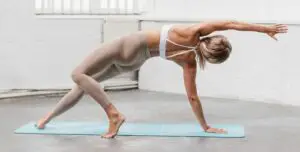There is a lot of confusion around what yoga actually is and how you should incorporate it into your life. As a yoga teacher, new participants often ask me whether attending class once a week is enough or if they should commit to a daily practice. They essentially wonder whether yoga can be a hobby or if it is something more.
A hobby is defined as a regularly practiced activity with some worthwhile purpose. If you enjoy yoga and do it frequently, you can definitely refer to it as a hobby. For some people, yoga will remain a beneficial hobby, and for others, it may start as a hobby and over time, develop into a lifestyle.
Yoga has a unique meaning for everyone. In this article, I will explain the benefits of having yoga as a hobby and how it becomes a lifestyle for many experienced yogis.
How Does Yoga Actually Help?
Whether you do yoga as a hobby once a week or as a daily ritual, you’ll undoubtedly experience the benefits of the practice. What sets yoga apart from other movement-based hobbies like sports and running is that it positively affects you physically, mentally, and emotionally. This is why you feel noticeably calmer after a yoga class and may even notice a shift in your mindset.
Yoga means ‘to yoke’ or ‘to unite’ in Sanskrit. The practice unites the body and mind by connecting to the breath. There is a significant emphasis on observing and focusing on your breathing as you perform yoga asanas, much more than other movement practices. In fact, it’s such an essential aspect that I often tell my yogis that yoga without breath awareness is just stretching.
This body and mind connection fostered during the practice results in a host of benefits to the body and mind:
- Reduction in stress and anxiety
- Less physical tension such as back pain
- Feeling more present
- Increased energy
- Better flexibility
- Improved lung and heart health
- Better sleep
- The ability to stay calm in stressful situations
- Better posture and balance
- Improved strength and endurance
Of course, the more you practice, the more you will experience these benefits. However, it’s not about how often you practice or how long, but more about the duration you maintain a regular practice.
For example, someone who practices yoga every day for 2 weeks will experience some of the above benefits for a short period, but they will not last long term. On the other hand, someone who practices yoga once a week for several years will gain long-term benefits, significantly improving their health and well-being.
Benefits to having yoga as a hobby
If you practice yoga once or a few times a week and focus predominantly on the physical side of the practice, yoga is likely one of your hobbies. Perhaps you attend classes at a gym, leisure center, or community center. However, even if you practice at home, at the park, or at the beach, it can still be a hobby.
Some hobbies can be pretty costly, requiring expensive equipment. However, yoga is a relatively cheap hobby, especially if the gym you are already a member of offers classes. There is also plenty of free or low-cost yoga content online, so you can practice at home with a good-quality yoga mat.
Aside from being low-cost, here are some other common reasons people choose to practice yoga as a hobby.
Social interaction & sense of community
As with all hobbies, some people choose yoga for the social aspect. A gym or community center is an excellent place to meet like-minded people and make friends. By attending yoga classes, you become part of that community and get to know the teachers and the other students who practice there. Thus, practicing yoga as a hobby can be particularly beneficial for someone who lives alone or has recently moved to a new area.
An alternative fitness activity
Many people choose yoga as a way to get fit. While yoga is not necessarily a fitness activity, it does share many of the same benefits, such as increased strength, more energy, and potentially weight loss.
Therefore, some people may choose to practice yoga instead of working out in the gym or going for a run as they find it more enjoyable. Dynamic styles like Ashtanga, Vinyasa, and Hot yoga are popular choices for those looking to do yoga to get fit.
To help muscle recovery
There is also a proportion of people who choose to do yoga to help with muscle recovery. Athletes, runners, cyclists, weight-lifters, and even surfers can benefit from yoga stretches. Attending a gentle yoga class such as Yin or Restorative Yoga will prevent injuries and help their body recover from those vigorous activities.
As an antidote to a busy life
Lastly, one of the most popular reasons people come to yoga is to relax and unwind. Another who leads a fast-paced lifestyle, from professionals to stay-at-home parents to entrepreneurs, will benefit from the mental benefits of decreased stress and anxiety. All yoga styles help you get out of your head and into your body, where you can focus on the present moment.
Can yoga become a way of life?
While yoga can be a fun and beneficial hobby, many people find it develops into a lifestyle choice.
The difference between practicing yoga as a way of life rather than a hobby is that you understand more than just the physical aspect of yoga. You’ll be aware of the energy moving through your body and the shifts happening in your mind. In addition, you’ll understand the philosophy behind the practice and live your life according to it.
If you’re practicing yoga in a gym or leisure center, you might not have the opportunity to learn and understand the other sides of the practice. What’s more, you’ll only know about the specific style of yoga taught there, which is usually Hatha or Vinyasa yoga.
However, by attending classes in a yoga studio or going on a retreat, you’ll discover different styles of yoga and learn about the 8 limbs, such as Dhyana (meditation), Pranayama (breathwork), and the Yamas and Niyamas (ethical codes of conduct).
Then, by studying yoga philosophy and reading books like “Light on Yoga” and “The Heart of Yoga,” you’ll discover where the practice comes from. You can also explore the energetics of yoga by learning about and working with the chakra system. This system consists of 7 energetic centers that you can open and balance through yoga poses and other yogic techniques.
Typically, yogis practicing yoga as a lifestyle will incorporate asana practice into a daily routine, combined with meditation, breathwork, or other yogic techniques. However, you don’t necessarily need to practice yoga postures every day to “live yoga” if you consciously practice some of the other 8 limbs.
In Closing
What yoga means to you will likely be different from what it means to someone else, but that’s totally ok. If you practice yoga as a hobby or social activity, you’ll still gain many incredible benefits. However, if you decide to learn yoga beyond the poses, you may notice how your thoughts, beliefs, and actions change as the practice guides you to become the best version of yourself.








